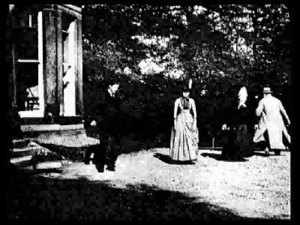Long Peace: Difference between revisions
No edit summary |
No edit summary |
||
| Line 5: | Line 5: | ||
| end = 1913 | | end = 1913 | ||
| image = Leprince-roundhay-reduxV2-frame.png | | image = Leprince-roundhay-reduxV2-frame.png | ||
| caption = | | caption = A still from the ''Longwood Garden Scene'', a motion picture filmed in [[Longwood]], [[Estmere]] in 1888, which is considered one of the world's first home videos. | ||
| before = [[Viridian Reaction]] | | before = [[Viridian Reaction]] | ||
| including = {{hlist|[[Estmerish Empire]]|{{wp|Realism (art movement)|Realism}}}} | | including = {{hlist|[[Estmerish Empire]]|{{wp|Realism (art movement)|Realism}}}} | ||
Revision as of 14:51, 17 April 2022
| Long Peace | |||
|---|---|---|---|
| 1855–1913 | |||
 | |||
| Location | Estmere | ||
| Including | |||
| Monarch(s) | Edward III, Richard XII, Edward IV | ||
| Leader(s) | Earl of Longwood, Baron Burke, Marquess Rhisling, Seymour Parnell, Earl of Tanqueray, Viscount Maraleigh, Marquess Ebrington, Baron Gorhambury, John Harris | ||
| |||
The Long Peace was an era of Estmerish history generally agreed to have lasted from the end of the War of the Triple Alliance in 1855 to the Great Collapse in 1913, though some historians extend the period until the beginning of the Kireno-Estmerish War in 1916. The period was named for the unprecedented peace which citizens of the Estmerish metropole enjoyed at the time, with Estmere being involved in no major conflicts in Euclea. Alongside this peace, the era saw relative political stability combined with the ascendency of parliament and increasing suffrage, slow but steady economic growth, and the rise of post-Romanticist cultural movements such as the Realists. Retroactively compared to the economic and political turmoil of the Great Collapse and the horror of the Great War, the Long Peace is seen as a Golden Age.